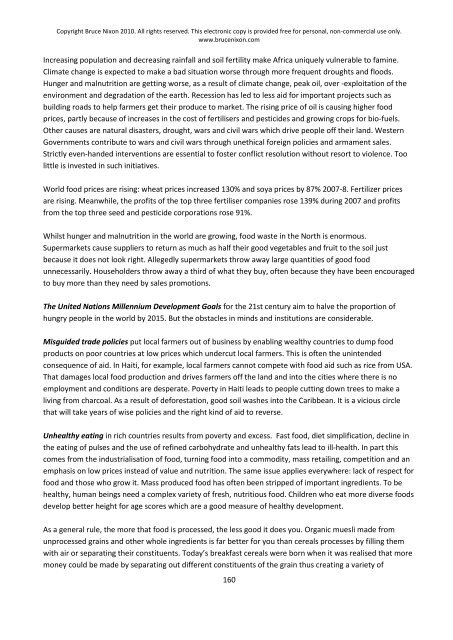A better world is possible - Global Commons Institute
A better world is possible - Global Commons Institute
A better world is possible - Global Commons Institute
Create successful ePaper yourself
Turn your PDF publications into a flip-book with our unique Google optimized e-Paper software.
Copyright Bruce Nixon 2010. All rights reserved. Th<strong>is</strong> electronic copy <strong>is</strong> provided free for personal, non-commercial use only.<br />
www.brucenixon.com<br />
Increasing population and decreasing rainfall and soil fertility make Africa uniquely vulnerable to famine.<br />
Climate change <strong>is</strong> expected to make a bad situation worse through more frequent droughts and floods.<br />
Hunger and malnutrition are getting worse, as a result of climate change, peak oil, over -exploitation of the<br />
environment and degradation of the earth. Recession has led to less aid for important projects such as<br />
building roads to help farmers get their produce to market. The r<strong>is</strong>ing price of oil <strong>is</strong> causing higher food<br />
prices, partly because of increases in the cost of fertil<strong>is</strong>ers and pesticides and growing crops for bio-fuels.<br />
Other causes are natural d<strong>is</strong>asters, drought, wars and civil wars which drive people off their land. Western<br />
Governments contribute to wars and civil wars through unethical foreign policies and armament sales.<br />
Strictly even-handed interventions are essential to foster conflict resolution without resort to violence. Too<br />
little <strong>is</strong> invested in such initiatives.<br />
World food prices are r<strong>is</strong>ing: wheat prices increased 130% and soya prices by 87% 2007-8. Fertilizer prices<br />
are r<strong>is</strong>ing. Meanwhile, the profits of the top three fertil<strong>is</strong>er companies rose 139% during 2007 and profits<br />
from the top three seed and pesticide corporations rose 91%.<br />
Whilst hunger and malnutrition in the <strong>world</strong> are growing, food waste in the North <strong>is</strong> enormous.<br />
Supermarkets cause suppliers to return as much as half their good vegetables and fruit to the soil just<br />
because it does not look right. Allegedly supermarkets throw away large quantities of good food<br />
unnecessarily. Householders throw away a third of what they buy, often because they have been encouraged<br />
to buy more than they need by sales promotions.<br />
The United Nations Millennium Development Goals for the 21st century aim to halve the proportion of<br />
hungry people in the <strong>world</strong> by 2015. But the obstacles in minds and institutions are considerable.<br />
M<strong>is</strong>guided trade policies put local farmers out of business by enabling wealthy countries to dump food<br />
products on poor countries at low prices which undercut local farmers. Th<strong>is</strong> <strong>is</strong> often the unintended<br />
consequence of aid. In Haiti, for example, local farmers cannot compete with food aid such as rice from USA.<br />
That damages local food production and drives farmers off the land and into the cities where there <strong>is</strong> no<br />
employment and conditions are desperate. Poverty in Haiti leads to people cutting down trees to make a<br />
living from charcoal. As a result of deforestation, good soil washes into the Caribbean. It <strong>is</strong> a vicious circle<br />
that will take years of w<strong>is</strong>e policies and the right kind of aid to reverse.<br />
Unhealthy eating in rich countries results from poverty and excess. Fast food, diet simplification, decline in<br />
the eating of pulses and the use of refined carbohydrate and unhealthy fats lead to ill-health. In part th<strong>is</strong><br />
comes from the industrial<strong>is</strong>ation of food, turning food into a commodity, mass retailing, competition and an<br />
emphas<strong>is</strong> on low prices instead of value and nutrition. The same <strong>is</strong>sue applies everywhere: lack of respect for<br />
food and those who grow it. Mass produced food has often been stripped of important ingredients. To be<br />
healthy, human beings need a complex variety of fresh, nutritious food. Children who eat more diverse foods<br />
develop <strong>better</strong> height for age scores which are a good measure of healthy development.<br />
As a general rule, the more that food <strong>is</strong> processed, the less good it does you. Organic muesli made from<br />
unprocessed grains and other whole ingredients <strong>is</strong> far <strong>better</strong> for you than cereals processes by filling them<br />
with air or separating their constituents. Today’s breakfast cereals were born when it was real<strong>is</strong>ed that more<br />
money could be made by separating out different constituents of the grain thus creating a variety of<br />
160
















